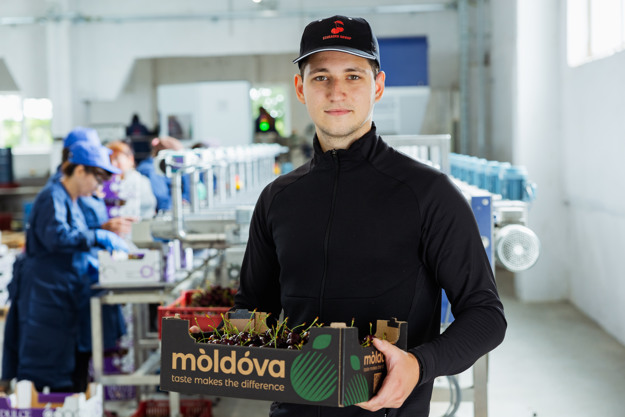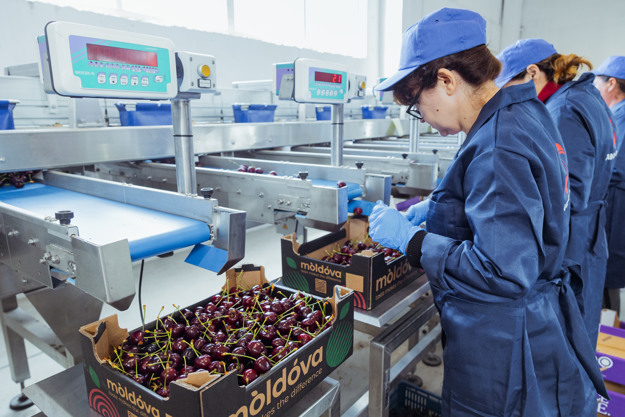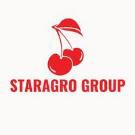Where the north of Moldova excels in apples and the south in grape cultivation, you find the tastiest cherries in the middle of the country. Staragro has had a cherry orchard there since 2008, which grew from 15 to 50 hectares over the years. "Good for an average of half a million kilos of cherries a year," begins Stefan Pislaru.
"From late May to late July, we harvest 16 varieties of cherries almost continuously - with very occasional breaks of a few days. The most important varieties are Kordia, a dark cherry that does well in practically every market, and Regina, a cherry with stable size, firm texture, and good shelf life."

Sales manager Stefan Pislaru
Diverse varieties
Partly because of labor issues - the staff's average age is 50, and it becoming increasingly hard to find good personnel in central Moldova, where the country's capital fiercely competes for the limited available workforce - the company embraces the strategy of cultivating multiple varieties in order to avoid a concentration of the harvest period.
"Each has its harvest time and average productivity, ranging from 5 to 15 tons per hectare, depending on pollination and meteorological conditions. It also allows us to give the pickers continual work over those two months. Planting the entire acreage with Kordia en Regina, although popular cherries on the European market, with their concentrated harvest time, makes little sense," says Stefan.
He adds that variety renewal is the way to go, though. "Just last year, we replaced five hectares of less demanded varieties with a new club variety, which was developed in Germany. The rootstocks came from the Netherlands. This productive cherry self-pollinates and is harvested a week later than the Kordia. And just as important: it's in demand on the EU market."
"But because preferences and requirements differ quite a bit per destination, with a rough distinction between Western and Eastern Europe, we like having several varieties in our assortment. Sales price is another difference between the two regions, and we conclude the best contracts in the West," Stefan explains.

First, the Netherlands
After having supplied the Russian and other CIS countries' markets for years, Staragro has, since 2020, focused on the European Union. "We started with a truckload of cherries to the Netherlands, where we still have contacts. Then we began shipping to places like Germany, Poland, the Baltic States, and Romania."
While Moldovan apples find it more difficult to gain entry to the EU, - its stores are filled to the brim with its own harvests for months - that is a more obvious market for stone fruit and grapes. For cherries, the story is slightly trickier, but there are certainly opportunities. "Proper post-harvest treatment is a must, particularly for a delicate product like cherries. Without hydrocooling, precision sorting, and traceability, you don't stand a chance," says the young sales manager.
Working toward an own brand
Immediately after being harvested in the warm spring and summer weather, the cherries must be rapidly cooled to maintain their quality. A hydrocooler drops the pit temperature to 2 ºC in 10-12 minutes. At Staragro, the cherries are then optically graded according to color, size, external and internal defects on a Unitec sorting line, and then stored, again, at 2 ºC. "Our clients always receive fresh cherries, for now, still in one, two, or five-kilo boxes. We're already thinking about punnets, but for that, we must first buy a new line. Also on the wish list is our own brand, although some buyers want packaging without a logo. Another option is the well-known crate with the slogan 'Moldova, taste makes the difference'," continues Stefan.
Art on the wall of Staragro's packing station
Rain
He cannot quite explain why this year's cherry harvest started a week earlier than usual. "There were even some problems with pollination because April was too warm. We had no night frosts after that, though we were prepared for that with a few gas heaters. Nets protect the cherries on the trees from hail storms. Rain is a potential game changer, too, and this year, the mid-harvest varieties suffered. Nevertheless, thanks to the sorting line, we were able to provide constantly good quality, even if the rain was challenging. We achieved nice volumes at the beginning of the season, and the late varieties, including Regina and Kordia, had no or hardly any cracking."
Lady Cot and Kyoto
Besides cherries, Starargo cultivates Lady Cot and Kyoto apricots on five hectares. They pick those throughout July, and this year was the first production in the orchards located in the municipality of Ustia, near the Dniester River. "As in all of Moldova, our harvest was satisfactory."
"We sent the apricots to the Netherlands and Romania. Despite the longer drive, bringing the stone fruit to the Netherlands pays off financially," indicates Stefan, who was assisted in telling the cherry and apricot story by Adelina Borta, Starargo's marketing specialist.
"I also think it's crucial to point out that we're driven by a passion for both fruit growing and our country," says Adelina. "Moldova is small and unknown, but that doesn't take away from the fact that it produces fruit of excellent quality. Sustainability is another aspect we don't neglect. We don't spoil water and a specialist business recycles all our waste plastic. Also, by installing even more solar panels we aim to stay completely self-sufficient in energy, even in full harvest period when a big user like our hydrocooler works overtime," she concludes.
Marketing specialist Adelina Borta, sales manager Stefan Pislaru and CEO Mariana Pislaru
Important visitor
Also nice to mention is that during a state visit to Chisinau on June 17, Staragro presented Antony Blinken, the US Secretary of State, with a basket full of cherries. That they were to his liking is evidenced by a wonderful letter addressed to Mariana Pislaru, Stefan's mother and company manager, and signed by Blinken himself. He expressed his gratitude for the delicious cherries he was privileged to find at the US Embassy.
Staragro is GlobalGAP and GRASP certified and will be at the upcoming Fruit Attraction in Madrid. You can find the company at the Moldova Fruct sector organization's joint stand, 10D18.
 For more information:
For more information:
Stefan Pislaru (Sales Manager)
Staragro Group Ltd
Ustia (Dubasari) – Moldova
Mob: +373 79 777 805
[email protected]
www.staragro-md.com
https://www.instagram.com/staragro_md/
https://m.facebook.com/100090805063482










